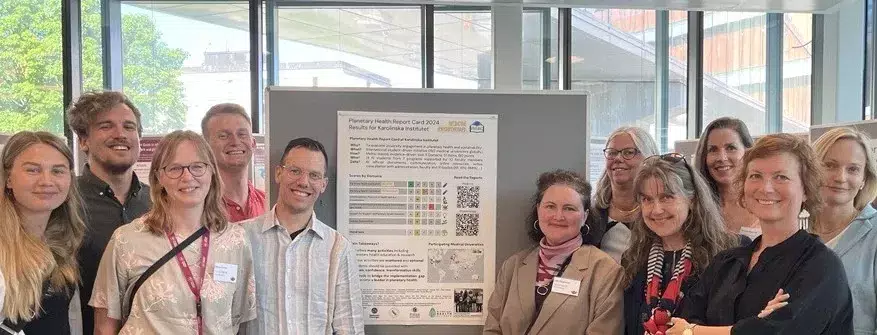Better grades and new study programme in student-driven planetary health report

Today, 5 June, we celebrate World Environment Day. Fittingly, the 2024 report from the Planetary Health Report Card (PHRC) was completed a couple of weeks earlier. Since its publication in May, the KI students who led the work can proudly present improved grades for the medical programme and one new programme in the report: the physiotherapy programme.
PHRC is a student initiative that allows students at medical universities to evaluate, compare and improve the content of their education. The long-term goal of PHRC is to improve planetary health. The first report was made by students at the University of California in San Francisco in 2019, and since then, many more institutions have joined. Thanks to a group of ambitious KI students, Karolinska Institutet also did, last year.
Higher grades for KI’s medical programme
This year, the second PHRC report that KI participated in was released. It shows an improved grade for the medical programme: from a C to a B, on a grading scale of E to A.
– The improved result can be attributed to the fact that more subjects requested by the PHRC report are covered now, in both the new and old medical programme*. We are pleased to see that lectures on planetary health are given in the early theoretical semesters, focusing on the win-win effects of health-promoting measures that are also climate-smart, such as active transport. At the same time, practical teaching in the clinical semesters is crucial for whether we can train medical doctors who can practice and develop sustainable healthcare, while also proactively working with the health effects of climate change, says Clara Kihlborg, a medical student in semester 8 who contributed to the report.
The physiotherapy programme is new in the PHRC report
Moreover, KI is one of three universities that have carried out the report for a physiotherapy programme for the first time this year. The physiotherapy programme at KI received a grade of C+ in this first evaluation.
– It’s pleasing and important that the physiotherapy programme at KI has had the opportunity to be evaluated and improve its education in the field of planetary health, says Emma Swärdh, licensed physiotherapist and assistant lecturer at KI who had the role of faculty mentor during the PHRC report work.
– The evaluation is important for increased understanding of the programme’s strengths, weaknesses, and possibilities for development in this field, she continues. We’re still at the start of it all, and I hope that PHRC will help us further develop the programme’s learning objectives and learning activities. Collaborating with students is key in this crucial work for a sustainable future. I also hope that more institutions offering physiotherapy programmes in Sweden will follow our example and realise the benefits of scrutinising the education and the university’s work with planetary health with the help of PHRC.
*The medical programme in Sweden was eleven semesters long until 2021. The new medical programme is twelve semesters and leads to a medical license instead of a medical degree. KI currently has students in both the old and new medical programme.
